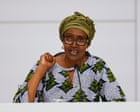
In the ever-changing tapestry of global affairs, a series of recent developments present both challenges and opportunities for the international community. Among these shifts, U.S. aid cuts, legal interpretations of climate rights, evolving protest dynamics, media guidelines, and electric vehicle market trends emerge as focal points.
The global fight against HIV/AIDS is facing a daunting challenge following substantial aid cuts by the U.S. administration. Winnie Byanyima, the executive director of UNAids, expresses deep concern about the potential impact of these reductions if they persist, projecting an additional six million HIV infections and four million AIDS-related deaths by 2029. These observations underline the critical need for continued and enhanced global cooperation and resource mobilization to tackle this pressing health crisis effectively.
On a different front, a landmark advisory opinion by the Inter-American Court of Human Rights, based in Costa Rica, asserts a human right to a stable climate. The court’s ruling emphasizes the moral and legal obligations of states to mitigate climate change, particularly for vulnerable populations. This assertion of climate rights marks an important precedent, reinforcing the global community’s commitment to addressing the extraordinary risks posed by climate change and encouraging nations to pursue resilient and sustainable environmental policies.
In the Netherlands, Greenpeace International is engaged in a pivotal court case, leveraging a newly enacted EU directive to contest a considerable legal financial burden imposed by a U.S. jury. The case arises from a previous ruling requiring Greenpeace to pay damages to an oil pipeline company, reflecting the heightened legal pressures faced by environmental activists. The outcome of this case holds significant implications for the global rights to protest and the ability to safeguard environmental advocacy against strategic lawsuits intended to silence public dissent.
Addressing the role of media in sensitive scenarios, survivors of past terror events and bereaved families in the UK are advocating for stricter guidelines on media conduct following such incidents. A new proposed code, endorsed by law enforcement and media representatives, encourages reporters to refrain from approaching bereaved families directly within the critical first 48 hours and instead communicate through official channels. This initiative seeks to ensure compassionate and respectful coverage that acknowledges the emotional realities faced by those affected.
In the realm of market trends, the UK’s electric vehicle sector is experiencing robust growth, with sales increasing by a notable 34.6% in the first half of 2025. This surge, buoyed by the strongest June for overall car sales since the pre-pandemic era in 2019, reflects a rising consumer interest in sustainable transportation options. As electrification becomes more mainstream, this growth signifies a positive shift towards reducing carbon emissions and promoting environmental sustainability.
Collectively, these developments encapsulate a period of transformation and adaptation, characterized by a blend of challenges that necessitate vigilant responses and opportunities ripe for constructive engagement. As each story unfolds, they collectively shape a landscape that prompts reflection, dialogue, and action aimed at navigating the complexities of our interconnected world with mindfulness and determination.
Source: {link}
